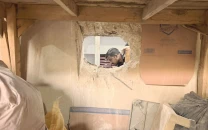Centuries-old boat village faces dual threat
Floating in the middle of Manchhar Lake, the village is home to 4,500 people
1601231579-0/Boat-village-main1600964759-4-(1)1601231579-0-640x480.webp)
Under the broiling midday sun, Mohammad Afzal Mallah, 15, rows a small wooden boat to his village, which floats on the waters of Manchhar Lake, the country's largest freshwater lake.
It took him a good 20 minutes to reach a cluster of boats anchored in the middle of the lake - home to the centuries-old Mohana or Mallah community, whose population has shrunk from 50,000 to only 4,500 people in less than three decades.
Sitting on the canoe's edge, Afzal's father, Mohammad Yousaf Mallah, explains the village's gradual decline.
"It's a bunch of problems - ranging from climate change and finances to health issues - which have propelled our people to leave their ancestral village in recent years," said Yousaf.
The lake has become a dumping ground for industrial waste, putting the lives of those who depend on the waters at risk.
Once-abundant fish stocks have gradually shrunk due to industrial effluents, declining water levels due to low rainfall, and the construction of barrages and dams on the Indus River.
"The water is everything for us, and also the only source of income. Fish were abundant, the water was clean and sweet, and diseases were far less until a few decades ago," Yousaf went on to say, referring to the rising number of eye and skin infections and waterborne diseases.
Floating homes
Yousaf waved to a bigger boat cruising towards the canoe. Made of solid diyar wood, this boat serves as a home for an extended family.
The 200-year-old village has only 45 boats left. Many families simply migrated to different parts of the country as they could not afford to repair their boats due to the shrinking fishing business.
The canoe's passengers carefully boarded the boat, which costs as much as 1.2 million Pakistani rupees and lasts for up to 40 years.
An infant slept in a corner on a ralli bedspread. Another portion of the boat was used as a kitchen, while the third and the fourth parts were reserved for children to play and store luggage and belongings. The government and NGOs have provided solar panels to power the boathouses; some even have television sets.
Loud music could be heard from nearby, with an engagement ceremony underway. A man usually arranges a new boathouse before getting married.
"The rising costs of boats have made it hard for a boy to marry early before 25 years. That's why the average marriage age is higher now," Yousaf said. "We do not put a burden on the girl's family. It's the boy's responsibility to arrange a new [boat] house for her."
Meanwhile, education has little space in the boat village - only three children, including Afzal, go to school in nearby Sehwan.
"As the lake dries up in the winter, our boats move further into the lake, increasing the distance to the shore. It stretches as much as two-and-a-half hours," explained Faiz Mohammad Mallah, a community leader. "It's hard for children to commute five hours a day."
Changing minds
Technology has also played a key role in 'changing the minds' of village youth.
"Many of them no longer want to live here. Access to television and mobile phones has changed their minds altogether," Yousaf said. "They want to migrate to cities."
Hundreds of families, he said, had migrated from the village in recent years, not only because of the declining fishing business but also for a better future for their children.
"Our children are in touch with their relatives in Sindh and Balochistan's fishing towns. This exposure to the outside world means they want to be like [the migrated children]," he added. "We are trying our best to carry on our old traditions, but it is difficult."
Afzal, a grade nine student, concurred. "Not only I but many others no longer want to live here. We want to go to school, play and make friends. What's here for us except for fish, birds and water? We want to be like normal people."
Glimmer of hope
But the embattled community sees the recent monsoon rains, which have filled the lake after a decade, as a glimmer of hope.
Record-breaking rains that destroyed infrastructure and crops across Sindh have produced enough fresh water to replace the lake's polluted waters.
"Clean water means more fish, more birds, and ultimately more business," said Yousaf, who either travels to Karachi or the adjoining districts to sell fish.
Plus, the residents no longer have to go to Sehwan for drinking water.
"If we have the same rain spells for the next few years, these barren banks and the lake itself will be filled with grass and herbs, improving the fish stocks. If it happens, maybe many of those who have migrated will return," he said.
Published in The Express Tribune, Septe0mber 28th, 2020.



















COMMENTS
Comments are moderated and generally will be posted if they are on-topic and not abusive.
For more information, please see our Comments FAQ